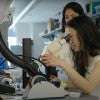
Graduate Student Spotlight: Tia Gray ’25
Tia Gray, a doctoral candidate in materials science and nanoengineering from Columbus, Georgia, found her way to Rice through the QuestBridge program.

Graduate Student Spotlight: Tia Gray ’25
Tia Gray, a doctoral candidate in materials science and nanoengineering from Columbus, Georgia, found her way to Rice through the QuestBridge program.

Scientists observe exotic quantum phase once thought impossible
A team of Rice researchers reported the first direct observation of a surprising quantum phenomenon predicted over half a century ago known as a superradiant phase transition, which occurs when two groups of quantum particles begin to fluctuate in a coordinated, collective way without any external trigger, forming a new state of matter.

Senior Spotlight: Sophianne Loh ’25
Sophianne Loh, a bioengineering major from Chicago, found her home at Rice in the strong sense of community and top-tier research opportunities.

Rice Biotech Launch Pad welcomes David Allison to external advisory board
The Rice Biotech Launch Pad, a Houston-based accelerator focused on expediting the translation of Rice University’s health and medical technology discoveries into cures, today announced the addition of David Allison to its external advisory board.

Cancer-fighting implant shows promise in treating melanoma, pancreatic and colorectal tumors
A team of researchers from the Rice Biotech Launch Pad has developed an implantable “cytokine factory” that safely triggers potent immune responses against hard-to-treat cancers, including metastatic melanoma, pancreatic and colorectal tumors.

Rice’s George R. Brown School of Engineering and Computing celebrated its 50-year anniversary with a recent two-day event that included panels, lab tours and a keynote address fromGary S. May, chancellor of the University of California, Davis.

Rice Engineering and Computing marks 50 years of discovery, design and impact
Rice’s George R. Brown School of Engineering and Computing celebrated half a century since its official inception with two days of events that gathered together nearly 400 people, including staff, faculty, students, alumni and friends of the school. Held March 28-29, the celebration included panel discussions as well as lab tours, alumni gatherings and student showcases.

Bioelectronic devices, neural interfaces, biosensors and AI hardware are now easier to make thanks to a streamlined method for fabricating a key material.

Energy-efficient power amplifier could speed up wireless networks for 5G and beyond, cut energy use
A team of Rice electrical engineers led by Taiyun Chi developed a new kind of power amplifier that combines cutting-edge design in both circuitry and electromagnetics, delivering unprecedented efficiency even under demanding, high-speed conditions.

Rice Biotech Launch Pad and RBL LLC to celebrate official launch and lab opening
The Rice Biotech Launch Pad and RBL LLC will hold an event to celebrate the official launch and lab opening of RBL LLC May 5, following a Rice presidential lecture delivered by Robert Langer Jr. The launch event, held at Helix Park, will also feature a keynote a keynote presentation by Robert Ruffolo Jr.

High-performance computing and artificial intelligence are increasingly transforming the energy sector, providing opportunities to optimize efficiency, scalability and sustainability. The 2025 Energy HPC Conference, hosted by Rice's Ken Kennedy Institute, took stock of the current state of science and technology to explore the implications of emerging research and innovation across the industry.

Rice’s Kaiyuan Yang and his team recently unveiled a first-of-its-kind authentication protocol for wireless, battery-free, ultraminiaturized implants that ensures these devices remain protected while still allowing emergency access.

Rice statistician earns CPRIT award to advance AI-powered precision medicine for prostate cancer
Rice statistician Erzsébet Merényi is part of a team of researchers awarded $1 million by the Cancer Prevention and Research Institute of Texas to develop AI tools that can identify lethal forms of prostate cancer earlier and improve treatment selection.

A recent symposium organized by the ENRICH office and the Rice Neuroengineering Initiative as part of the Meeting of the Minds NeuroNetworking Series explored ethics and policy in brain science today, including in the context of psychedelic-assisted therapy.

Wade Adams, former director of the Richard E. Smalley Institute for Nanoscale Science and Technology at Rice, passed away Feb. 12 at the age of 78. A self-described “technical optimist,” Adams was not only an experienced researcher and educator but also an enthusiastic advocate of nanotechnology, which he defined as “making small stuff do big things” and viewed as offering potential solutions to pressing challenges, particularly in energy but also in clean water and medicine.